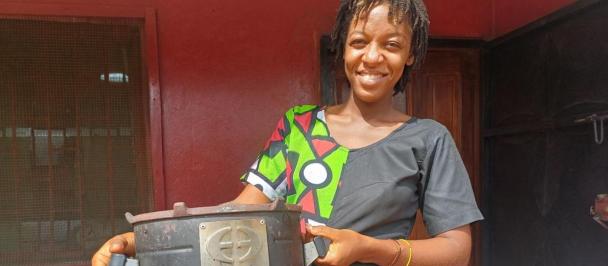Strengthening the backbone of Kosovo’s judicial system
June 6, 2022
Professional legal associates play an important role in enabling judges to effectively perform their functions. The relationship between the judge and the legal associate is based on confidentiality and trust. A legal associate must understand and have the ability to deal with the demands and restrictions that are particular to judicial life.
There are almost 300 legal professional associates in Kosovo working behind the scenes, ensuring that the courts and prosecution offices can operate and proceed with legal cases. Legal associates conduct legal research, liaise with court staff, manage case files - and most importantly - draft court decisions for judges to finalize.
It is for this reason that the professional legal associates are considered as the ‘backbone’ of the judiciary. They are the people behind the scenes in helping the judges and prosecutors take forward legal cases. This is particularly important in the case of Kosovo where the courts are dealing with a backlog of thousands of cases that have accumulated over the years.
Although professional legal associates are considered the backbone of the judiciary, most of them have not benefitted from a systematically designed training programme before joining the justice system. This is due to limited capacities of institutions that have mainly focused on trainings for judges and prosecutors. Recognizing the need for more systematic training for professional legal associates, UNDP and UNMIK joined forces to respond to the challenge.

UNDP and UNMIK, in partnership with the Academy of Justice, joined forces and pooled together their collective intelligence, funding and resources to strengthen the capacities of 160 professional legal associates. Building on the results and experiences under this pilot initiative, the rest of the professional legal associates will be trained by the Academy of Justice throughout 2022. This joint initiative proved to be catalytic by developing the training methodology and approach which will now continue to be driven by the Academy of Justice.
Prior to these training sessions, the Training Manual for Professional Legal Associates - covering civil and criminal justice - was created in 2021 as a practical tool for training the legal professionals, and, to serve as a guidance for the legal professionals in their everyday work. The tailor-made training for legal associates was designed based on the manual. 160 legal associates from all courts throughout Kosovo participated in the training sessions.
Learning through argumentation and sharing
The training participants were selected by the Academy of Justice and Courts and Prosecution Administrators by designating five to six professional legal associates per court and prosecution office in one training group. The trainees were mixed both from gender perspective and ethnic composition and came from different parts of Kosovo.
The trainings delivered by the Academy of Justice trainers - who are also judges and prosecutors - provided a unique learning space for professional legal associates and legal officers from all Kosovo courts and prosecution offices. The training included specific discussions and exchanges on practical cases - civil and criminal - prepared by trainers. Through legal constructive arguments as well as sharing of views and opinions by all participants, the training sessions created a conducive learning environment. A new network of legal community was established that will allow for professional legal associates to stay connected even after training is completed in June 2022.
Dejana Kostić, from the Basic Court in Graçanicë/Gračanica was one of the participants at this training. Dejana says that training helped her to understand what others are doing: “The experiences of the others help us, as legal professionals, to understand better the challenges we are encountering. It is of utmost importance to work and learn every day. Each case is different, and we are facing unique legal issues every day”, says Dejana.
In Kosovo, both Albanian and Serbian language are official languages, and Dejana emphasizes the importance of translators in courts: “Access to the documentation and court hearings in the language of our parties is at the core of our work. We enable people to practice their rights in the language they understand. This is something that we are proud of. As I am myself from a minority community in Kosovo, I understand the importance of it”, says Dejana. She is pleased she had an opportunity to learn and share her everyday practice with other colleagues from different parts of Kosovo.
Hekton Bujupaj is an experienced legal professional from Basic Court of Pejë/Peć. He has worked for 10 years in this court and values the training that he participated in. “Every day, we learn something new. For me, this was an opportunity to hear how others are managing their responsibilities. It is very difficult to prepare everything for one trial. Sometimes it takes us lot of time to properly draft judge’s decisions”, said Hekton.
Hekton explaines that there are around 50 employees in the Basic Court of Pejë/Peć and these people are working hard to reduce the backlog of unsolved cases in the court. This job is enormous: “We have unsolved cases which have been pending to be processed for many years, and we understand what this means for people. The entire judicial system in Kosovo and all staff are pushing to solve all of them. We hope that through our efforts, we will manage to help people in exercising their rights”, said Hekton. He hopes for more opportunities like this where he can meet other colleagues and learn new innovative approaches in judiciary.

Talking to these legal professionals, we understand the importance of their work. Their work directly affects the accumulated cases in the courts and the efficiency of the court system. That is why it is important to understand their work and how it can be further improved. Seeing the diversity - in terms of gender, age, and ethnicity - we are assured of the legal capacity in Kosovo.
Through the Support to Strengthening the Rule of Law in Kosovo project, UNDP contributes towards an independent, accountable, and effective justice system, which promotes human rights standards and ensures access to justice for all. In partnership with UNMIK, we contribute to developing the capacities of legal practitioners to improve the quality of justice; ensuring that people can exercise their language rights in courts through provision of court translators, improving the court transparency, and improving the court archive system.
Photo credit: Arben Llapashtica for UNDP Kosovo

 Locations
Locations
